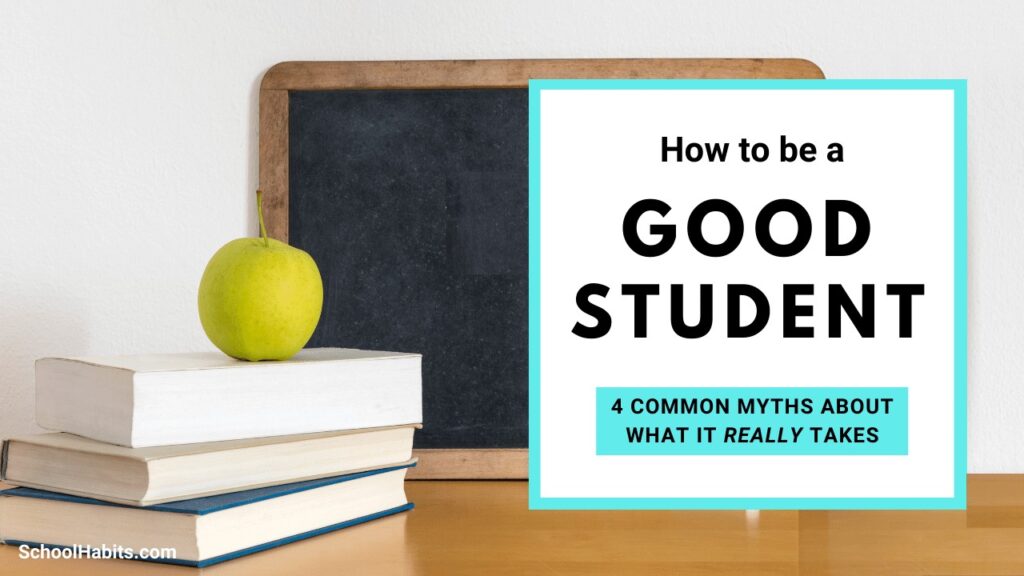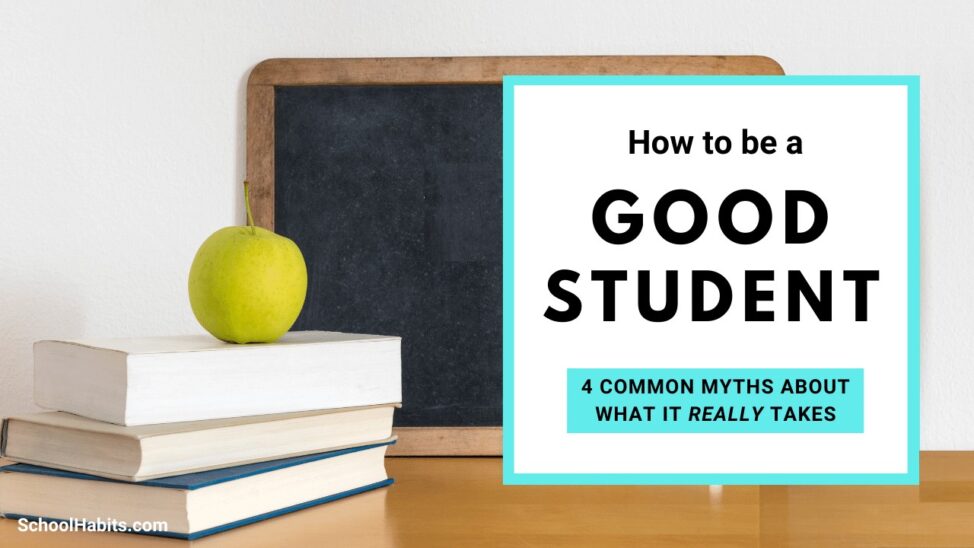By Katie Azevedo, M.Ed.

There are a lot of misconceptions floating around about how to be a “good” student. Included in these common myths are false ideas about study habits, memorization, and time spent on homework.
In this tutorial, I share 4 common myths about what it really takes to be a“good” student, and I prove them wrong by showing you what top-scoring students really do.
How to be a good student: 4 common myths about what it really takes
1. Myth #1: Good students study for hours at a time.
This myth is insanely false, despite the fact that it’s one of the most popular beliefs about how to be a good student. Studying for hours at a time does not work. Long study sessions trick us into thinking we are learning, but in reality, we lose the ability to focus and retain information after a certain period of time.
Reality: Top-scoring students study by using spaced repetition and active recall instead of epic study sessions. Spaced repetition is when you study for a short period (maximum one hour) and then leave the material alone for a length of time (try periods of 30 minutes, 60 minutes, 2 hours, and 24 hours). After your break, come back to the material and study it again, using active recall. Active recall is when you put yourself in a state of trying to remember something. It’s the process of not looking at your notes and trying to recall what you’re learning. Sometimes it gives us that “it’s on the tip of my tongue!” feeling. Active recall can be uncomfortable and frustrating – which is a sign you’re doing it correctly.
2. Myth #2: Good students are just naturally smart.
Many top-scoring students have high IQs, just as many students with poor grades also have high IQs. The reverse is also true: many top-scoring students have average IQs, and many students with poor grades have lower IQs. In other words, natural intelligence is not a good indicator of success in school.
What makes a good student is more connected to one’s school habits (hey, what a great name for a blog) than one’s natural intelligence.
Reality: Top-scoring students rely on legitimate study techniques that work for them, and they take time to figure out what those methods are. Additionally, they establish systems and routines that support learning, such as shut down routines, morning routines, and Sunday routines. They track homework tasks using an assignment notebook (and they know these assignment notebook hacks), and when they sit down to work, they really do the work. This means no phones, no distractions, no shortcuts that bypass actual learning.
3. Myth #3: Good students have no fun or social lives.
This common misconception couldn’t be further from the truth. In fact, many top-scoring students are busier with extra-curricular activities than are students with lower grades.
Reality: Top-scoring students often have good grades because they are so involved in extracurricular activities. The less free time a student has, the more they need to be a time management ninja. That’s the secret of good students: they are insanely excellent at time management.
“Good” students use time management strategies the Pomodoro Technique, time-block planning, and saying no. Top students also know how to prioritize so that they don’t become overwhelmed with work. They also stay on top of their sleep hygiene and almost never pull all-nighters. (If you get anxious before bed, try these nighttime anxiety tips.)
4. Myth #4: Good students get better grades because they are better at memorizing.
Let’s be clear: memorizing is not learning. Memorizing is only temporary storage, and is only useful in rare and urgent scenarios in which you’ll be recalling the information within an hour or less.
Reality: Want to know how to be a good student? Stop memorizing! Good students do not rely on memorization. Instead, they understand the importance of learning material (truly learning it!) over time. They want to learn it. They try to make sense of it. They care about studying it so it sticks around longer than an hour.
What makes a good student is their consistent effort to learn new information over an extended period of time using the following techniques: summarizing notes, rewriting notes, making cheat sheets throughout a unit of study, asking questions, and reviewing concepts every few days.
Final notes on how to be a good student
Being a good student who earns top grades is not about epic study sessions, weird memorization “hacks,” or high IQs. These are all common myths that we have to stop believing. Sticking to these myths prevents you from doing the real work.
Do some of the strategies that I listed here take time? Yep. Can they be challenging? Yep.
But they work – and isn’t that worth it?

